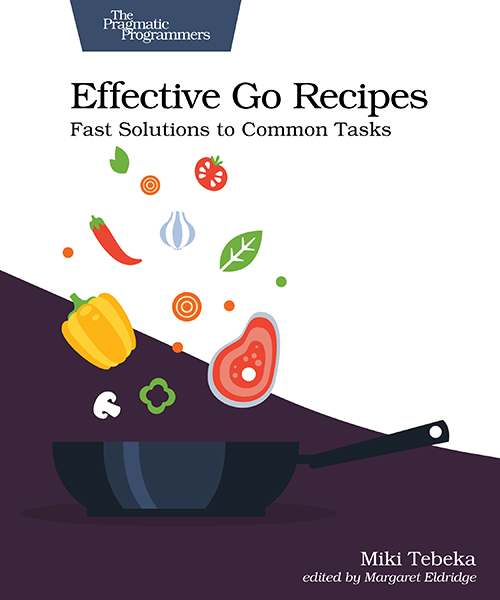Miki Tebeka @tebeka
edited by Margaret Eldridge @Margaret
Programmers love Go because it is lightweight, easy to work with, and easy to read. Go gives you the benefits of dynamically typed languages (speed of development) while keeping the upsides of strongly typed languages (security and performance).
Go is a simple language, but programming in Go is about more than just mastering syntax. There’s an art to using Go effectively. Squeeze out the full use of advanced networking and multi-core power for which Go was designed. Save precious coding hours with recipes that help you manage objects, collect garbage, and safely use memory. Tackle Unicode, concurrency, and serialization with ease.
All the clean, reusable solutions you need for a wide variety of problems common to Go development. Outfitted with these recipes, your next apps will be more polished and more maintainable than ever.
Start out by tackling time and see how the Go time packager provides types that will do most of the heavy lifting for you. Next, work on recipes tailored to the nuances of processing text, like normalizing strings to avoid bugs. From there, whip up some functions on-the-fly and store functions in variables and data structures.
Ever wondered why Go seems to be peppered with error handling? Working through the next recipes, you’ll discover the benefits, which include more robust code. In the section on HTTP, you’ll learn tricks like running multiple HTTP servers on the same port and setting timeouts. With concurrency recipes, you’ll limit the number of goroutines to improve performance, give your code awareness of timeouts, and decide when to keep your code sequential instead of making it concurrent.
Throughout the book, you’ll make Go sizzle following simple recipes and tweaking them to fit your own apps. Using tools like strong typing and concurrency primitives, build a Go codebase that stays maintainable at scale.
Miki Tebeka has a B.Sc. in computer science from Ben Gurion University. He is the CEO
of 353solutions, where he teaches and writes code in Go, Python, and Scientific
Python. Miki has authored several books and is a LinkedIn learning author. He
also organizes and give talks at several conferences around the world.
- Full details: Effective Go Recipes: Fast Solutions to Common Tasks by Miki Tebeka
- View this book’s portal and details on how to post errata and suggestions here.
Don’t forget you can get 35% off with your Devtalk discount! Just use the coupon code “devtalk.com" at checkout ![]()

